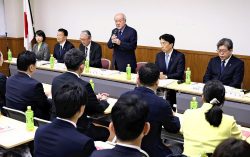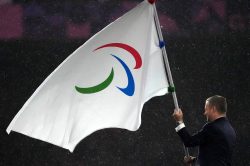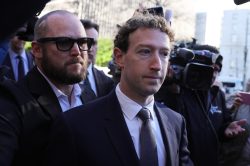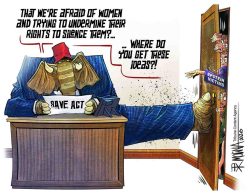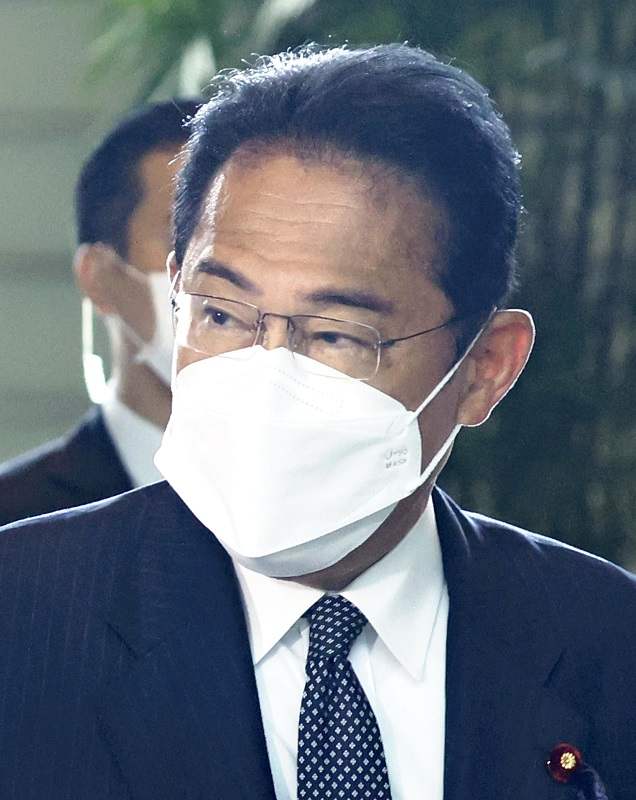
Prime Minister Fumio Kishida enters the Prime Minister’s Office in Tokyo on Monday morning.
6:00 JST, July 12, 2022
Prime Minister Fumio Kishida will take the ruling coalition’s victory in the House of Councillors election as a sign to expedite efforts to work out economic measures.
Chief among these is coping with the issue of inflation, as prices continue to rise due largely to Russia’s ongoing invasion of Ukraine.
Kishida also hopes to bring about his signature “new form of capitalism” policy, bearing in mind the compilation of a supplementary budget during an extraordinary Diet session this autumn.
Many difficult tasks lie ahead for his administration, including coordination over fiscal resources needed to enhance the nation’s defense capabilities and balancing of measures to deal with the novel coronavirus as well as to reinvigorate economic activities.
“By aptly tackling these big challenges, such as the novel coronavirus, the Ukraine situation, and measures to cope with soaring prices, I will make efforts to revitalize the Japanese economy,” Kishida said on an NHK TV program Sunday night, showing his strong desire to deal with these tasks.
The number of seats the ruling coalition won in Sunday’s election far exceeded the minimum target of 55 that Kishida had set to retain the bloc’s majority in the upper house.
“The prime minister’s humble and sincere political attitude has been given high credit,” said a key Cabinet member.
Kishida has cited as a key task the reinvigoration of the nation’s economy battered by the COVID-19 pandemic. He intends to reshuffle his Cabinet and the LDP leadership as early as August.
According to public opinion polls taken by The Yomiuri Shimbun, the approval rating of the Kishida Cabinet has constantly hovered above the 50% line throughout the nine months since it was inaugurated. Yet, the high approval rating also has much to do with the fact that the administration has put weighty policy issues on the back burner.
The late Prime Minister Shinzo Abe, shot to death Friday, will have a large impact on how the administration is run in the days ahead. Abe’s administration was the longest in the postwar period. He had a strong say even after he stepped down, as he became the leader of the LDP’s biggest faction.
Abe had called on Japan to spend “at least 2%” of its gross domestic product on defense, on par with nations that are members of the North Atlantic Treaty Organization. To fund this, Abe had advocated the issuance of government bonds and held various discussions within the party.
Regarding policy coordination with the LDP since Kishida became its president and the nation’s prime minister, a senior party member said, “Abe had a clear vision of how he viewed the nation and would take steps boldly, whereas Kishida would put the brakes on, with the two subtly dividing their roles.”
Referring to Abe as a central figure within the party’s dynamics, a Cabinet member under previous Prime Minister Yoshihide Suga said, “Opinions among the conservatives may be split over ways to find funding such as for defense spending, making consensus-building within the party difficult.”
Kishida has made it clear that to realize his “new form of capitalism,” he will double the outlays on “investment in human resources,” such as through vocational training. While social security spending continues to increase, how to secure the resources for his signature policy will also become a focal point, together with funds for defense outlays.
Kishida’s tenure as LDP president runs through September 2024, one year before House of Representatives members’ terms expire.
“The achievements made in the two years up to the party presidential election will be important,” said a person close to Kishida.
In terms of diplomacy, Kishida needs to continue strengthening Japan’s cooperation with countries in the West over the Ukrainian issue. Japan will host the summit of the Group of Seven advanced economies in Hiroshima next May, and a concerted response to cope with any attempts to change the status quo with force will likely be the main theme. Although Japan and China will celebrate the 50th anniversary of their normalization of relations in September this year, incursions by China Coast Guard vessels into Japan’s territorial waters around the Senkaku Islands in Okinawa Prefecture has become routine occurrences.
Kishida represents a lower house constituency in Hiroshima, which was the first city to experience an atomic bombing. The prime minister is actively moving ahead with his lifework of advancing nuclear disarmament. On Aug. 1, he will be the first Japanese prime minister to attend the Review Conference of the Parties to the Treaty on the Non-Proliferation of Nuclear Weapons to be held in New York.
Top Articles in Politics
-

Japan PM Takaichi’s Cabinet Resigns en Masse
-

Sanae Takaichi Elected 105th Prime Minister of Japan; Keeps All Cabinet Appointees from Previous Term
-

Japan’s Govt to Submit Road Map for Growth Strategy in March, PM Takaichi to Announce in Upcoming Policy Speech
-

LDP Wins Historic Landslide Victory
-

LDP Wins Landslide Victory, Secures Single-party Majority; Ruling Coalition with JIP Poised to Secure Over 300 seats (UPDATE 1)
JN ACCESS RANKING
-

Japan PM Takaichi’s Cabinet Resigns en Masse
-

Japan Institute to Use Domestic Commercial Optical Lattice Clock to Set Japan Standard Time
-

Israeli Ambassador to Japan Speaks about Japan’s Role in the Reconstruction of Gaza
-

Man Infected with Measles May Have Come in Contact with Many People in Tokyo, Went to Store, Restaurant Around When Symptoms Emerged
-

Man Infected with Measles Reportedly Dined at Restaurant in Tokyo Station



